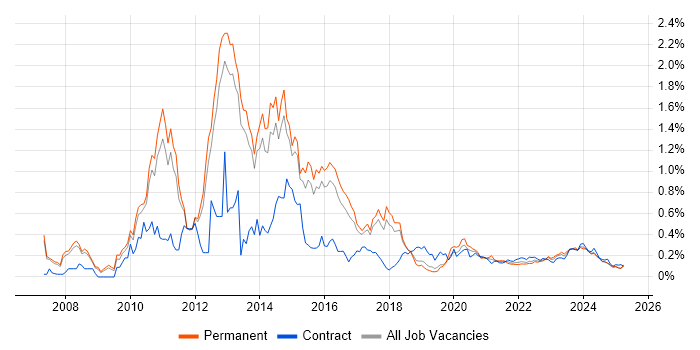Microsoft System Center Operations Manager (SCOM)
UK > Work from Home
The table below provides summary statistics and salary benchmarking for remote or hybrid work requiring SCOM skills. It covers permanent job vacancies from the 6 months leading up to 9 January 2026, with comparisons to the same periods in the previous two years.
| 6 months to 9 Jan 2026 |
Same period 2025 | Same period 2024 | |
|---|---|---|---|
| Rank | 355 | 420 | 421 |
| Rank change year-on-year | +65 | +1 | +209 |
| Permanent jobs citing SCOM | 8 | 19 | 66 |
| As % of all permanent jobs with remote/hybrid work options | 0.053% | 0.12% | 0.31% |
| As % of the Systems Management category | 0.59% | 0.83% | 2.05% |
| Number of salaries quoted | 8 | 8 | 49 |
| 10th Percentile | £35,500 | £33,199 | £42,201 |
| 25th Percentile | £40,000 | £42,050 | £47,500 |
| Median annual salary (50th Percentile) | £44,000 | £46,653 | £56,525 |
| Median % change year-on-year | -5.69% | -17.46% | -1.70% |
| 75th Percentile | £60,000 | £60,891 | £59,000 |
| 90th Percentile | £82,500 | £77,500 | £74,250 |
| UK median annual salary | £50,250 | £53,930 | £42,920 |
| % change year-on-year | -6.82% | +25.65% | -18.48% |
All Systems Management Skills
Work from Home
SCOM falls under the Systems Management category. For comparison with the information above, the following table provides summary statistics for all permanent job vacancies with remote or hybrid options requiring systems management skills.
| Permanent vacancies with a requirement for systems management skills | 1,364 | 2,298 | 3,226 |
| As % of all permanent jobs with a WFH option | 9.03% | 13.95% | 15.22% |
| Number of salaries quoted | 981 | 1,368 | 2,765 |
| 10th Percentile | £37,500 | £41,250 | £40,278 |
| 25th Percentile | £48,750 | £52,500 | £50,000 |
| Median annual salary (50th Percentile) | £65,000 | £70,000 | £65,000 |
| Median % change year-on-year | -7.14% | +7.69% | -6.40% |
| 75th Percentile | £82,500 | £87,500 | £84,056 |
| 90th Percentile | £100,000 | £108,517 | £97,500 |
| UK median annual salary | £62,500 | £69,308 | £65,000 |
| % change year-on-year | -9.82% | +6.63% | -3.70% |
SCOM
Job Vacancy Trend for Remote/Hybrid Jobs
Historical trend showing the proportion of permanent IT job postings citing SCOM and offering remote or hybrid work options relative to all permanent IT jobs advertised.

SCOM
Salary Trend for Remote/Hybrid Jobs
Salary distribution trend for jobs with remote/hybrid work options citing SCOM.

SCOM
Salary Histogram for Remote/Hybrid Jobs
Salary distribution for jobs with remote/hybrid work options citing SCOM over the 6 months to 9 January 2026.
SCOM
Co-Occurring Skills & Capabilities in Remote/Hybrid Jobs by Category
The following tables expand on the one above by listing co-occurrences grouped by category. They cover the same employment type, locality and period, with up to 20 co-occurrences shown in each category:
